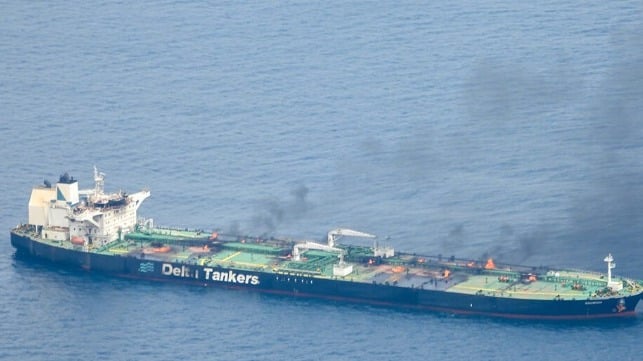Report: Houthis On Track to Earn $2B a Year by Shaking Down Shipowners

An as-yet-unreleased UN report suggests that Yemen's Houthi rebels have figured out a way to monetize their blockade of the Red Sea: insiders report that the group is operating a multi-billion-dollar tolling operation on the strategic waterway, extracting covert payments from shipowners in exchange for the right to pass safely. If accurate, the safe passage tolls may be among the group's largest sources of income, and would give the Houthis a significant financial incentive to continue attacks on shipping - regardless of the group's ideological motives.
In a long-running research project on the conflict in Yemen, a panel of experts compiled a 500-plus page report for the UN Security Council on Houthi capabilities, finances and alliances. The findings depict an organization that has grown rapidly, both at home and in its near abroad. The Houthi militia has developed a sophisticated international network for shipping, money laundering, smuggling, recruitment and piracy, earning revenue at multiple touch points along the way.
The latest revenue opportunity is linked to the group's politically-motivated blockade of shipping on the Red Sea, enforced through prolific missile and drone attacks. The Houthis launched more than 130 strikes on merchant ships from last November through the end of July, the expert panel assessed. "The group’s shift to actions at sea increased their influence in the region," the panel wrote. "Such a scale of attacks, using weapon systems on civilian vessels, had never occurred since the Second World War."
Houthi leaders claim that their ballistic missile and drone attacks are targeted at ships linked to Israel and its allies. In practice, the group has repeatedly attacked a wide variety of vessels with no clear connection to Israel or the West. Some of the targeted ships have even been carrying cargoes for Houthi-supporting nations, including the group's primary sponsor, Iran.
While many analysts have put the scattered attack pattern down to faulty targeting, the UN panel's conversations with local shipbrokers suggest that Houthi forces also have a financial method for target selection. Shipowners can quietly pay the group a fee for a safe transit, implying that the shipowners who do not pay might have an unsafe transit.
"The sources estimate the Houthis’ earnings from these illegal safe-transit fees to be about $180 million per month," the panel reported, noting that it has not been able to verify the information independently.
If the report is accurate, the Houthis could be generating more revenue from safe-transit fees than they earn by taxing petroleum imports, one of their biggest sources of income. If Houthi leaders ever agreed to cease strikes on Red Sea shipping, the group would be giving up more than $2 billion a year in income, along with a substantial source of regional influence and leverage.
The report also provides extensive details on the Houthis' ties to terrorist organizations (Al-Qaeda, Al-Shabaab and Hezbollah) and pirate action groups in Somalia, as well as details of its well-known links to the Iranian military apparatus and its "Axis of Resistance."
"The scale, nature and extent of transfers of diverse military materiel and technology provided to the Houthis from external sources, including financial support and training of its combatants, is unprecedented," the panel concluded.
